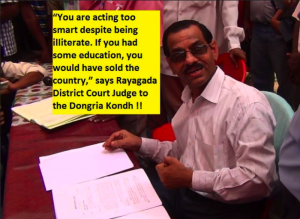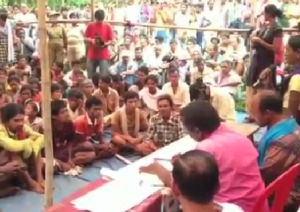
On 18th July 2013 the first of 12 village council (Palli Sabha) meetings was held at Serkapadi village on the Niyamgiri Hills, and the 36 registered voters from the village who attended voted unanimously to oppose the Vedanta mine, a resounding NO which sets the tone for the following meetings.
Supporting the attendees were hundreds of Dongria and Kutia Kond from other villages on and around the mountain some of whom had camped overnight to ensure they would not be stopped by the four platoons of CRPF police forces stationed on the mountain, on their way. With bystanders looking on from the edges of the meeting, the 36 participants gave defiant speeches against the mine and after much argument with the district judge.
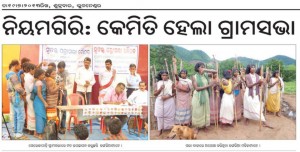
Gobind Sikaka’s speech answered categorically the Supreme Court’s central question on whether the proposed mine would affect the rights of the tribal population to worship their mountain God, which has been portrayed by the Odisha State government and the media as residing in one spot at the peak of the mountain. He said:
“The Niyamgiri is our revered God; we have been worshipping it for thousands of years. We are worshipping the trees and every spot of the hill range. If anybody takes away Niyamgiri Hills from us, it will undermine our religion and faith and the Dongaria Kondh tribe will perish.
“The forest officials are trying to hoodwink us; they have collected fake signatures. But in no case would we quit the hills…we are prepared to fight till the last drop of blood is shed,” he said.
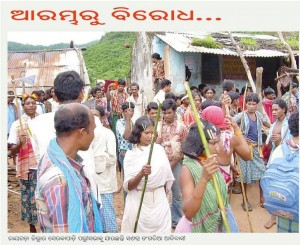 A Dongria woman, Rupa Jakesika, stood up and interrupted the administrators when they began to use legal language regarding the process and the settling of individual and community claims. Refusing to be confused into any compromise she stopped them mid track saying:
A Dongria woman, Rupa Jakesika, stood up and interrupted the administrators when they began to use legal language regarding the process and the settling of individual and community claims. Refusing to be confused into any compromise she stopped them mid track saying:
“we don’t want any of these complex arguments. We have already discussed and decided between ourselves that we won’t give Niyamgiri.”
On the eve of the meeting she told members of the press: “Nobody messes with our god. Tomorrow we will show them the door.”
Showing his true colours, and his clear partiality, the Rayagada district judge Sarat Chandra Mishra, who presided over the meeting, raised his voice at a tribal who demanded to see a photocopy of the resolution they were being asked to sign saying:
“You are acting too smart despite being illiterate. If you had some education you would have sold the country”
At the Palli Sabha the villagers gave this statement to a local journalist:
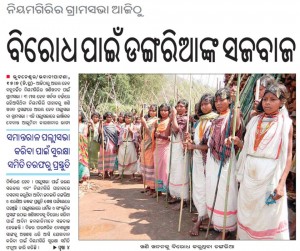 “We the villagers of Serkapadi declare unanimously that the entire Niyamgiri Mountain Range is ours. We the Dongria tribals and forest dwellers are rightful community owners of these mountains, the water, the soil, the trees and the stones etc of this mountains. It is our God. As you can not chop down a person’s nose, hand, or any other body part, you can not say that this mountain is not sacred or that river is not ours… We commonly own all these. We can not live outside these mountains. We have been living here since ages. It will be sharp attack on our religious belief and practices if you try to separate the entities. We can not tolerate any harm to our god, and if required we will shed our lives together like fish taken out of water, if any part of our mountains are given out.” Source: Amitabh Patra.
“We the villagers of Serkapadi declare unanimously that the entire Niyamgiri Mountain Range is ours. We the Dongria tribals and forest dwellers are rightful community owners of these mountains, the water, the soil, the trees and the stones etc of this mountains. It is our God. As you can not chop down a person’s nose, hand, or any other body part, you can not say that this mountain is not sacred or that river is not ours… We commonly own all these. We can not live outside these mountains. We have been living here since ages. It will be sharp attack on our religious belief and practices if you try to separate the entities. We can not tolerate any harm to our god, and if required we will shed our lives together like fish taken out of water, if any part of our mountains are given out.” Source: Amitabh Patra.
Serkapadi’s Palli Sabha sets a fantastic tone for 11 remaining meetings. Despite all the efforts of the legal system, the State Government, CRPF forces and the district judge to manipulate and obstruct democracy, the council was held transparently and the villagers opposition was registered by the press, and (hopefully) the administration.
Not taking any chances Niyamgiri Suraksha Samiti are still organising parallel Palli Sabha’s in many of the 120 or more villages not consulted by the official proceedings. These will be held once the 12 official palli sabha’s are complete and resolutions submitted to the state government.
Foil Vedanta send heartfelt congratulations to all the Dongria and Kutia Kond, and all those who worked so hard to make this Palli Sabha fair and transparent against all odds.
Below are several articles covering the meeting in detail:
Please also see videos of the proceedings here and here.
First Post
Vedanta vs Niyamgiri: How a tiny tribal hamlet said no to mining
by Jay Mazoomdaar
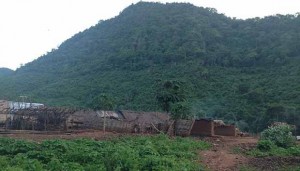
Serkapadhi, Odisha: If anything, this morning failed to show the day. Neither the routine nor the festive in the build-up could anticipate the acrimonious drama that was soon to follow. In the end, the historic day that saw the first ever palli sabha taking a call on a Rs 40,000-crore mining project was saved, literally, by the sheer resolution of a tiny tribal hamlet.
The build-up was elaborate. Along the two and a half kilometer walk across a stream from Panimunda to Serkapadhi, it was impossible to spot gun toting camouflage in the lush hills flanking the trail. But the CRPF jawans were there, all five platoons of them, positioned early to create a security cordon around Serkapadhi that hosted a pack of officials, including the district judge.
The irony of this sudden over-representation of the state was not lost on a village where the only symbols of sarkar have been a tubewell, two solar poles and a defunct primary school room. What struck a balance was the presence of a larger contingent of politicians, activists, volunteers, media-persons and big support from other Dongria Kondh villages.
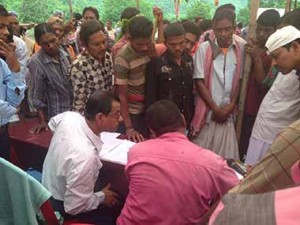
Sarat Chandra Mishra, the district judge of Rayagada and the court-appointed independent observer, reached early, wearing a bullet-proof jacket and riding pillion. Cops rested with boxes of tear gas shells under their feet in the shadow of a jackfruit tree weighed down by its bounty. Then, the solidarity march began. More than a hundred Dongria Kondhs from neighbouring villages arrived, walking single file and carrying axes and sticks, to follow the proceedings that commenced sharp at 11 am with 36 of the village’s 44 “alive voters” making up the quorum.
Immediately, Gobinda Sikaka, an angry village youth in a red T-shirt with ‘Max India’ written on it, launched a sharp-tongued attack on a local official, accusing him of betraying the tribals’ cause in the past, and set the tone for the day. After Mishra assuaged Sikaka promising fair play, more than 20 villagers, majority of them women, expressed themselves like probably none in their habitually shy tribe ever dared. They spoke of Niyamgiri as their god and mother, the source of their physical and cultural sustenance, and vowed to die rather than watch it being ravished.
But the stage for confrontation was already set. On 7 July, local revenue and forest officials had conducted a joint verification of the individual and community rights of the villagers and identified areas of religious importance in and around Serkapadhi. Activists held a press conference in Bhubaneswar last week, alleging that the villagers were tricked by officials in to sign this report that restricted their rights to the village periphery. As the report was scheduled to be endorsed by the palli sabha, the villagers pressed Judge Mishra to reject it in acceptance of the Dongria Kondh’s community right to the entire Niyamgiri hills.
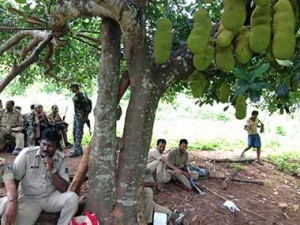
As Mishra insisted that rejecting the report would amount to relinquishing all the rights recorded in it, the meeting hit the first roadblock. After some heated negotiation, villagers gave up the demand for scrapping the report and agreed to a resolution that would note their additional rights. While the resolution was being drafted, someone demanded that the villagers were entitled to a photocopy of the signed minutes, drawing a hasty refusal from Mishra.
Then, Mishra made a costly faux pas. “You are acting too smart despite being illiterate. If you had some education, you would have sold the country,” he snapped. Spoken casually, the words angered an already distrustful crowd. A section of the press contested Sharma while some villagers complained of upper caste prejudice. It was chaos.
Meanwhile, the resolution was ready and was read out aloud. It noted the gist of individual speakers’ statements, highlighting their dependence of Niyamgiri, and also validated the state government’s 7 July report. None objected immediately. Before the draft was offered to the villagers for signing, the judge wanted that the details of the quorum be mentioned in it. In those few minutes, Serkapadhi put its foot down.
Insisting that the resolution mentioned their “additional rights”, Mishra got into an argument to persuade the villagers who refused to budge. At this point, a village elder suggested that the villagers would calm down and agree to sign if the judge left the resolution at the table and waited elsewhere. “How long should I wait,” shot back Mishra, “I’ll have to cancel the palli sabha if they don’t sign.” The final round of argument centred on Mishra demanding geographical specifications of the areas where villagers were to claim their right. “You cannot claim the entire Niyamgiri,” he repeated several times.
With tempers fraying, just when it appeared that the proceedings had hit a dead end, someone in the melee shouted that the villagers were not claiming individual but collective right to the entire hills, a point that was made by others several times before. In an anti-climax, Mishra said he was fine with community rights and added a line at the end of the resolution. The villagers, led by headman Indra Sikaka, queued up in relief. All signatures in place by 2-45 pm, a visibly hassled Mishra shouted at the media for trying to photograph the resolution and left in a hurry.
As the exhausted crowd dispersed, the villagers consulted their leaders in nervous excitement. To many, it was still not clear if it was just a technical confusion that delayed the resolution for over an hour. “All’s well that ends well,” I heard a fellow journalist congratulate a bunch of activists. “Wait until all ends well,” one of them waved back with a wry smile. “There are still 11 palli sabhas to go.”
Business Standard
Dongaria Kondhs say no at first meeting
Verdict to decide fate of Vedanta Aluminium’s Rs 40,000-cr projects in Odisha that will source bauxite from Niyamgiri
‘Niyam raja zindabaad’
Slogans of “Niyam Raja (worshipped by the Dongaria Kondhs) zindabaad” filled the air at the end of the sabha, held in the presence of police personnel. The proceedings were overseen by Rayagada District Judge Sarat Chandra Mishra.
The proceedings were initiated by Indra Sikaka, president of the forest rights committee of Serkapadi. “We are not going to surrender Niyamgiri Hills to anyone — company, government or individual. The entire Niyamgiri range offers us shade, quenches our thirst and is the source of our livelihoods. That is why we are fighting for our rights,” Sikaka said.
Representatives from the joint venture partners of the proposed project — state-run Odisha Mining Corporation and Vedanta Aluminium — were conspicuous by their absence at the sabha.
Members of non-governmental organisations such as Amnesty International and the Niyamgiri Suraksha Samiti stood outside the barricaded space.
This was perhaps the first time the Dongaria Kondhs got a chance to air their grievances in public and assert their rights.
The highlight of the sabha was the views articulated by Gobind Sikaka, a young Kondh. “The Niyamgiri is our revered God; we have been worshipping it for thousands of years. We are worshipping the trees and every spot of the hill range. If anybody takes away Niyamgiri Hills from us, it will undermine our religion and faith and the Dongaria Kondh tribe will perish.
“The forest officials are trying to hoodwink us; they have collected fake signatures. But in no case would we quit the hills…we are prepared to fight till the last drop of blood is shed,” he said.
Another speaker, Dongu Sikaka, said, “Niyamgiri Hills will be converted into a desert if bauxite mining is allowed. Even if 10,000 tribals have to give up their lives, they are not going to quit the hills.”
